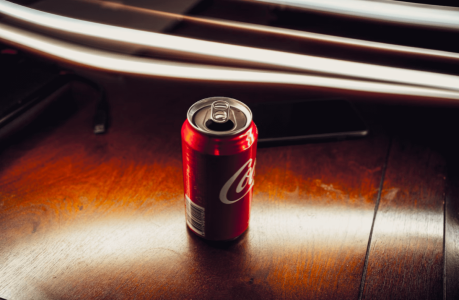Do you think diet soft drinks are the 'healthier' choice? Think again!
- Replies 3
Are you trying to live a healthier lifestyle and cut back on sugar? Diet drinks might seem like a no-brainer choice to satisfy your sweet tooth without the added calories, but have you ever felt like you were even hungrier after drinking one?
You're not alone. Studies show that artificial sweeteners in these drinks could be the culprit!
In fact, these beverages could be causing your body to crave even more sugar! The sweet taste triggers an insulin response, but since there's no actual sugar to process, your body is left feeling undernourished and craving more.
And let's face it, that's not going to lead to healthy snacking choices!

Beware of the double whammy when it comes to artificial sweeteners and real sugar - this dangerous duo can really pack a punch when it comes to your cravings. Not to mention, consuming ultra-processed foods alongside these sweeteners can make the effect even worse.
But that's not the only concern when it comes to these supposedly 'diet-friendly' drinks. Recent studies have revealed that artificial sweeteners may be even more harmful to our bodies than we originally thought.
These sweeteners can disrupt the delicate balance of our microbiome, which plays a crucial role in supporting our digestion and immunity. And disturbing this balance can lead to an increased risk of metabolic diseases, like type 2 diabetes.
In a previous article, we delved deeper into the harmful effects of consuming diet soft drinks, and one major concern is weight gain.
Research has shown that both sugar-sweetened and artificially sweetened beverages can be linked to weight gain. In fact, a meta-analysis conducted in 2017 revealed that consuming 5% to 6% of daily calorie intake from non-nutritive sweeteners could increase the risk of weight gain by up to 54%.
This means that even though diet soft drinks are often associated with weight loss and good health, excessive consumption over time can still disproportionately impact your weight.
As with most things, moderation is key. While consuming diet soft drinks in appropriate amounts may be considered safe, it's important to note that they are not the most nutritious choice.
However, there are some health benefits to consuming zero calories and sugars, as mentioned by Justine Rosado, a registered dietitian nutritionist and certified diabetes care and education specialist.
For individuals with diabetes who enjoy regular soft drinks, diet versions may be seen as a viable option.
'Used in appropriate amounts, diet soft drinks are a safe way to enjoy a sweet-tasting beverage while keeping blood sugars stable,' they said.

So if you want to take control of your health and avoid these harmful effects, it's time to ditch the diet drinks and opt for healthier alternatives that won't leave you craving more sugar. Your body will thank you for it!
So, you might be wondering, 'What are some better choices?'
The good news is that there are plenty of other refreshing beverages that can quench your thirst without the harmful effects of soft drinks ('diet' or not).
But it's important to be mindful of what you're choosing as a substitute. Replacing fizzy drinks with high-sugar fruit juices or processed tea and coffee drinks that are loaded with added sugar isn't much better for your health.
Instead, consider opting for drinks that are low in sugar, such as unsweetened iced coffee or tea. Not only will you be reducing your sugar intake, but you'll also be adding beneficial antioxidants to your diet.
Another great option is low-fat or unsweetened soy milk, which provides essential vitamins and nutrients like calcium. These healthier alternatives can help you make a positive impact on your health while still enjoying a delicious and refreshing beverage.

While diet soft drinks may seem like a convenient way to reduce sugar intake and manage weight, the scientific evidence is pointing towards potential risks associated with their consumption.
From increased cravings for sugar to disruptions in gut health and potential weight gain, it's important to be mindful of the impact of diet soft drinks on our overall health. As with any food or beverage, moderation is key!
Consider opting for healthier alternatives such as unsweetened coffee or tea, low-fat or unsweetened soy milk, and plenty of water to stay hydrated. It's also crucial to listen to your body and make informed choices that align with your individual health goals.
Members, have you ever tried to completely eliminate soft drinks from your diet? If so, how did it impact your health? And what steps have you taken to reduce your sugar intake and make healthier choices when it comes to beverages? Share your thoughts and experiences in the comments below!
You're not alone. Studies show that artificial sweeteners in these drinks could be the culprit!
In fact, these beverages could be causing your body to crave even more sugar! The sweet taste triggers an insulin response, but since there's no actual sugar to process, your body is left feeling undernourished and craving more.
And let's face it, that's not going to lead to healthy snacking choices!

Consuming low-calorie sweeteners may drive people to crave more sugar, as the body expects sugar when sensing a sweet taste. Credit: Unsplash/Ayesh Rathnayake.
Beware of the double whammy when it comes to artificial sweeteners and real sugar - this dangerous duo can really pack a punch when it comes to your cravings. Not to mention, consuming ultra-processed foods alongside these sweeteners can make the effect even worse.
But that's not the only concern when it comes to these supposedly 'diet-friendly' drinks. Recent studies have revealed that artificial sweeteners may be even more harmful to our bodies than we originally thought.
These sweeteners can disrupt the delicate balance of our microbiome, which plays a crucial role in supporting our digestion and immunity. And disturbing this balance can lead to an increased risk of metabolic diseases, like type 2 diabetes.
In a previous article, we delved deeper into the harmful effects of consuming diet soft drinks, and one major concern is weight gain.
Research has shown that both sugar-sweetened and artificially sweetened beverages can be linked to weight gain. In fact, a meta-analysis conducted in 2017 revealed that consuming 5% to 6% of daily calorie intake from non-nutritive sweeteners could increase the risk of weight gain by up to 54%.
This means that even though diet soft drinks are often associated with weight loss and good health, excessive consumption over time can still disproportionately impact your weight.
As with most things, moderation is key. While consuming diet soft drinks in appropriate amounts may be considered safe, it's important to note that they are not the most nutritious choice.
However, there are some health benefits to consuming zero calories and sugars, as mentioned by Justine Rosado, a registered dietitian nutritionist and certified diabetes care and education specialist.
For individuals with diabetes who enjoy regular soft drinks, diet versions may be seen as a viable option.
'Used in appropriate amounts, diet soft drinks are a safe way to enjoy a sweet-tasting beverage while keeping blood sugars stable,' they said.

Carbonated water is a great alternative to soft drinks, and can be flavoured with a slice of lemon, lime or cucumber for added taste. Credit: Unsplash/Conor Brown.
So if you want to take control of your health and avoid these harmful effects, it's time to ditch the diet drinks and opt for healthier alternatives that won't leave you craving more sugar. Your body will thank you for it!
So, you might be wondering, 'What are some better choices?'
The good news is that there are plenty of other refreshing beverages that can quench your thirst without the harmful effects of soft drinks ('diet' or not).
But it's important to be mindful of what you're choosing as a substitute. Replacing fizzy drinks with high-sugar fruit juices or processed tea and coffee drinks that are loaded with added sugar isn't much better for your health.
Instead, consider opting for drinks that are low in sugar, such as unsweetened iced coffee or tea. Not only will you be reducing your sugar intake, but you'll also be adding beneficial antioxidants to your diet.
Another great option is low-fat or unsweetened soy milk, which provides essential vitamins and nutrients like calcium. These healthier alternatives can help you make a positive impact on your health while still enjoying a delicious and refreshing beverage.
Key Takeaways
- Diet soft drinks may not be the healthy choice they are often perceived to be, as research suggests they may be linked to weight gain and other harmful effects on health.
- Studies have shown that consuming artificial sweeteners, found in diet soft drinks, can trigger cravings for more sugar and disrupt the delicate balance of the gut microbiome, increasing the risk of metabolic diseases.
- While diet soft drinks may be considered safe in moderation and can be a suitable option for individuals with diabetes, it's important to be mindful of the potential negative effects.
- Experts suggest exploring healthier alternatives such as unsweetened teas, low-sugar beverages, and nutrient-rich options like unsweetened soy milk.
While diet soft drinks may seem like a convenient way to reduce sugar intake and manage weight, the scientific evidence is pointing towards potential risks associated with their consumption.
From increased cravings for sugar to disruptions in gut health and potential weight gain, it's important to be mindful of the impact of diet soft drinks on our overall health. As with any food or beverage, moderation is key!
Consider opting for healthier alternatives such as unsweetened coffee or tea, low-fat or unsweetened soy milk, and plenty of water to stay hydrated. It's also crucial to listen to your body and make informed choices that align with your individual health goals.
Members, have you ever tried to completely eliminate soft drinks from your diet? If so, how did it impact your health? And what steps have you taken to reduce your sugar intake and make healthier choices when it comes to beverages? Share your thoughts and experiences in the comments below!







